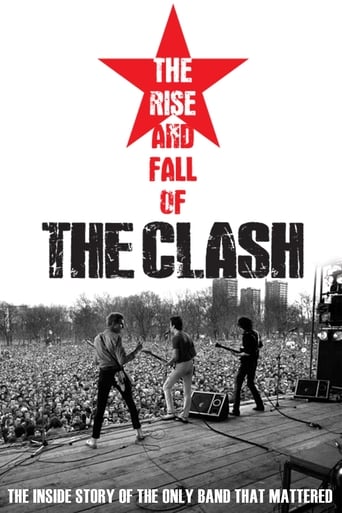

If you are a fan of the Clash as I am, you will be left depressed and uninspired by this documentary. If you know little about the band, you'll probably be bored to tears, which is not saying much for the filmmakers, whose subject is one of the most exciting bands of the era. I knew we were in trouble when the first fifteen minutes were almost all talking head interviews about the Clash's first manager's personality.This amazing, thrilling band and their game-changing music deserve so much better than two hours of depressing interviews about "how we started to fall apart." What they did right is so much more interesting.
... View MoreYeah, it's called the RISE AND FALL, but really only focuses on the fall. I remember seeing the trailer back in 2012 and it was pretty apparent from that that the later days of the band would be in focus. If you're prepared for that then I think you will really enjoy this documentary. There already exists other better documentaries about The Clash's earlier days and their prime. But all of them completely ignore the last years, which is a shame. Cut the Crap sucks, but it's still an interesting story to tell. If you've seen all the other Clash documentaries and feel that you want to know more about the fall and The Clash post-Mick Jones, go watch this one. But don't expect any story of their rise.
... View MoreAny film that claims to document the rise of the Clash and then barely mentions London Calling and Sandinista is not a good film. Most of the film centers on manager Bernie Rhodes' influence and the demise of the band once Mick Jones left the group. Not featuring London Calling is simply inexcusable. It is one of the greatest rock and roll albums of all time. It also put the band on the map in America.I would only recommend this film to people who don't like the Clash and want to engage in a little schadenfreude about how pathetic the group came to an end with the dreadful Cut the Crap album. This film was made by someone who clearly has no love for the group. A complete waste of resources. There is a documentary called "Joe Strummer: The Future is Unwritten" that is a far superior look at this great band.
... View More"The Rise and Fall of the Clash" is a documentary made up of lots of archival footage (much of which is very grainy and poor quality—mostly because video from the late 1970s was still rather primitive) as well as many interviews of various band members, friends and associates. Unfortunately, the film did not have a subtitle option—which is a shame as I am slightly hard of hearing and the accents were occasionally difficult for this American to fully understand. I should let you know that I am not a fan of The Clash. It isn't that I have anything against the group—I just never heard much from them back in the 1970s and 80s other than "Rock the Casbah", as I was listening to different sorts of music. So, when the editor of Influx asked me to review this film a while back, I really didn't feel that qualified to review the documentary. But, fortunately, one of my best friends is a HUGE fan of the group and so I invited him over to see and discuss the film. Because of this, I am going to review the film both for fans and non-fans alike.First, for the non-fans, I must point out that The Rise and Fall of the Clash is not a thorough documentary about the group. Most of their early years are barely mentioned and the film really centers on what happened to the band after they began to gain worldwide fame and why the group never really maintained their full potential. To sum it up, everyone in the film blames the band's manager, Bernie Rhodes, for destroying the band by deliberately causing divisions within the band and making lots of stupid and unscrupulous business decisions. And, according to these same folks, he sought to deliberately change the band's sound—creating music that everyone was apparently in the band was ashamed of in their final album. How true all this is, I have no idea whatsoever but it is all quite interesting—albeit a bit confusing as I knew none of the band's back story and needed to stop the film a few times to ask my friend, Guy, what exactly was occurring.And now for the fans, this film is excellent because it explains how and why the lineup and style of the band changed so much over the years. Guy said he now understood why the band broke up and what was going on behind the scenes. For him, it was an informative stroll down memory lane—and he thoroughly enjoyed the documentary. When I asked him if he had any complaints he said that there were none but he said he can easily understand how the film would confuse many viewers who didn't know a lot about the band. For those like me, he recommends we see "The Clash: Westway to the World" first, as it's a definitive documentary about the band—with less about their internal politics and more about their music and influence on punk rock.As you can no doubt guess, I strongly recommend the film for fans like Guy. They'll understand and appreciate all the behind the scenes politics and like seeing most of the band members again--though one band member, Joe, died before the film was made and could not contribute and since the film excoriated Bernie Rhodes, it's not surprising he, too, is not in the film. If you are NOT a fan, I recommend that you watch the film with a die-hard fan (perhaps Guy will come over and explain it to you too), see the other documentary first or read up on the band and listen to an album or two first. While interesting, much of the film is like walking into the middle of a soap opera—one where you really don't understand the context.
... View More